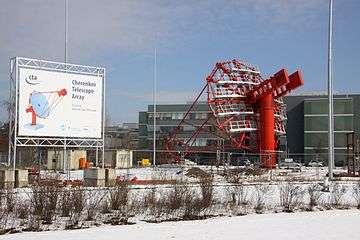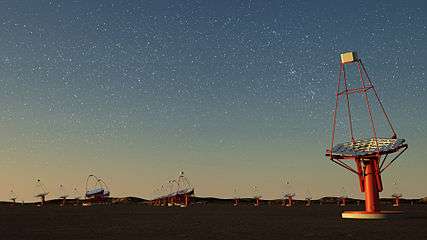Cherenkov Telescope Array

The Cherenkov Telescope Array or CTA is a multinational, worldwide project to build a new generation ground-based gamma-ray instrument in the energy range extending from some tens of GeV to above 100 TeV. It is proposed as an open observatory and will consist of two arrays of Imaging Atmospheric Cherenkov telescopes (IACTs), a first array at the Northern Hemisphere with emphasis on the study of extragalactic objects at the lowest possible energies, and a second array at the Southern Hemisphere, which is to cover the full energy range and concentrate on galactic sources. The physics program of CTA goes beyond high energy astrophysics into cosmology and fundamental physics.
CTA intends to improve the flux sensitivity of the current generation of IACTs such as MAGIC, HESS, and VERITAS by an order of magnitude. It will foreseeably consist of tens of IACTs of different mirror sizes. Production of the first telescope prototypes started in 2013. CTA is designed and will be built by an international collaboration of scientists, with a strong involvement of European institutions. The project is on the road-map of the European Strategy Forum on Research Infrastructures (ESFRI), the European Astroparticle Physics network ASPERA and the European Astrophysics network ASTRONET.
The entire project, with its planned 19-dish array in the Northern Hemisphere and its 99-dish array in the Southern Hemisphere is expected to cost about €200 million (US$277 million).[1]
Members
As of May 2015, the CTA Consortium consists of over 1,200 members working in 200 institutes from 32 countries: Argentina, Armenia, Australia, Austria, Brazil, Bulgaria, Canada, Chile, Croatia, Czech Republic, Finland, France, Germany, Greece, India, Ireland, Italy, Japan, Mexico, Namibia, Netherlands, Norway, Poland, Slovenia, South Africa, Spain, Sweden, Switzerland, Thailand, the United Kingdom, Ukraine and the United States.[2][3]
Site selection

On 15 and 16 July 2015, the CTA Resource Board decided to enter into detailed contract negotiations for hosting CTA on the European Southern Observatory (ESO) Paranal grounds in Chile and at the Instituto de Astrofisica de Canarias (IAC), Roque de los Muchachos Observatory in La Palma, Spain. The Board made the decision after months of negotiations and careful consideration of extensive studies of the environmental conditions, simulations of the science performance and assessments of construction and operation costs to start contract negotiations with ESO and Spain. The Namibian and Mexican sites will be kept as viable alternatives.[5]
On 26 March 2015, the CTA Resource Board, composed of representatives of ministries and funding agencies, decided to begin negotiations with two countries: Spain (La Palma) and Mexico (San Pedro Mártir). Arizona will be kept in consideration as a possible back-up site. After negotiations, the Board will select the final site in November 2015.[6]
"Paranal Observatory First Choice to Host World's Largest Array of Gamma-ray Telescopes". Retrieved 17 July 2015. The project is expected to move forward with construction of the first telescopes on site planned for 2016.
On 10 April 2014 Government representatives met in Munich and decided to start negotiations with the two sites for the planned array in the Southern Hemisphere: Aar in Namibia and ESO's Paranal–Armazones site in the Atacama Desert of northern Chile, keeping Leoncito in Argentina as a third option. Negotiations were expected to conclude in August 2015.[7]
Gallery
-

Prototype of 12 meter CTA telescope under construction (Berlin, 2013)
-

Artistic drawing of the CTA site (G Perez, IAC)
References
- ↑ "Panel homes in on sites for γ-ray detector". Nature - international weekly journal of science. 17 April 2014. Archived (PDF) from the original on 30 April 2013. Retrieved 30 April 2014.
- ↑ "Countries and Institutes in CTA" (dated listing on website, as of 2014). cta-observatory.org. 30 March 2015. Retrieved 11 August 2015.
- ↑ "Paranal and La Palma Sites Chosen for Final Negotiations to Host World's Largest Array of Gamma-Ray Telescopes" (PDF). Cherenkov Telescope Array (CTA) Resource Board. 16 July 2015.
- ↑ name="eso-ann15058"
- ↑ "Paranal and La Palma Sites Chosen for Final Negotiations to host CTA" (PDF). CTA Project Office. 16 July 2015.
- ↑ "Site Negotiations for CTA North" (PDF). CTA Project Office. 26 March 2015.
- ↑ "ESO Site Shortlisted for Cherenkov Telescope Array". ESO - European Southern Observatory. 15 April 2014. Retrieved 29 April 2014.
External links
- Official web page of CTA
- Official web page of ESFRI
- Official website of ASPERA
- Official website of ASTRONET